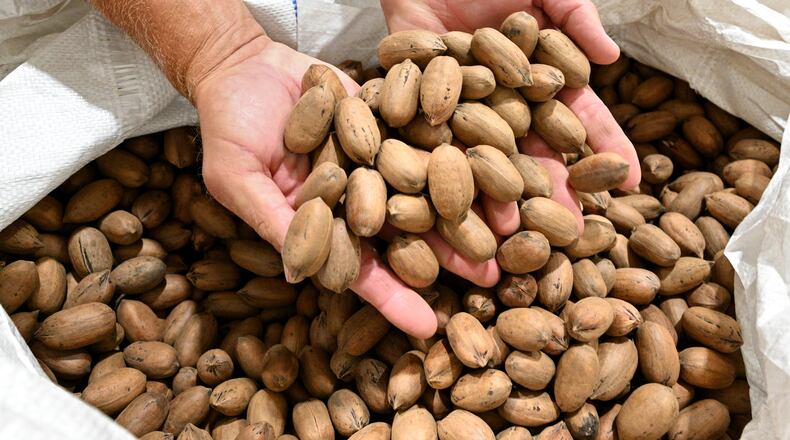One reliable constituency for Republicans is rural America and farmers. But what they’re hearing from Donald Trump right now might well bring back memories of rough economic times when he was in office.
In the final stretch to Election Day, Trump is focusing his economic message on massive increases in tariffs on goods imported into the United States.
“To me, the most beautiful word in the dictionary is ‘tariff,’” Trump declared this week, threatening to impose import duties of ”100, 200, 2,000%.”
Trump’s goal is to force companies to make their products in America, with American jobs.
What does that have to do with farmers? Well, when tariffs go up, farmers usually get caught in the crossfire of a trade war.
Georgia farmers have seen this before. When Trump raised tariffs in 2018 and 2019, the Chinese retaliated, slapping higher tariffs on cotton, peanuts, pecans and soybeans — prime Georgia farm exports.
That trade spat hit U.S. farmers hard nationwide and led to an unprecedented $28 billion federal bailout by the Trump administration.
This week, two major farm groups — the National Corn Growers Association and the American Soybean Association — joined to publicly warn against a new trade fight with China.
While the study bemoaned the impact of 2018 tariffs on U.S. farmers and noted all the campaign talk this year about even higher tariffs, there was one word curiously missing: “Trump.” It was almost like a mystery president had levied those tariffs.
While it’s no secret that leaders of major farm groups would more likely support Trump in November, they have said precious little about his tariff pledge — and the possible impact on farm country.
It’s much the same in Congress. While GOP lawmakers eagerly echo Trump about illegal immigration, most aren’t saying anything about tariffs.
“I’m not a big fan of tariffs,” U.S. Rep. Austin Scott, R-Tifton, said this summer after Trump floated massive tariff increases in a meeting with House Republicans.
The unique thing to remember about tariffs is that Congress doesn’t factor into that policy equation because a president can raise and lower tariffs without the approval of lawmakers.
On the campaign trail, Vice President Kamala Harris has turned Trump’s tariff threat into a warning that it will feed inflation for consumers. “He plans to impose what I call a ‘Trump sales tax,’” Harris said this week in Pennsylvania, maintaining it “will cost the average American family more than $4,000 a year.”
Economists also don’t like Trump’s idea. But Trump isn’t budging.
“I’m a believer in tariffs,” Trump says — though many of his supporters don’t seem to be on board.
Jamie Dupree has covered national politics and Congress from Washington since the Reagan administration. His column appears weekly in The Atlanta Journal-Constitution. For more, check out his Capitol Hill newsletter at jamiedupree.substack.com.
About the Author






